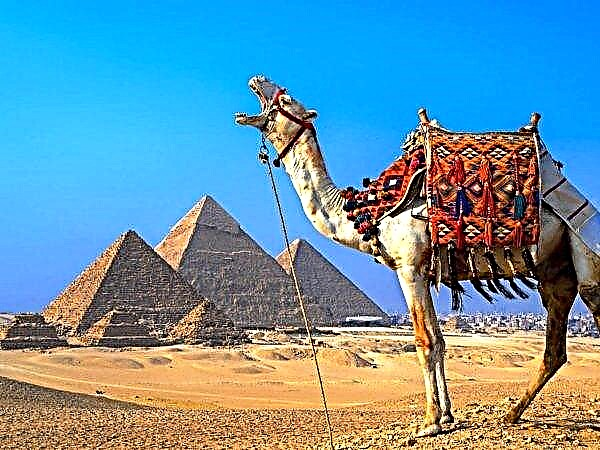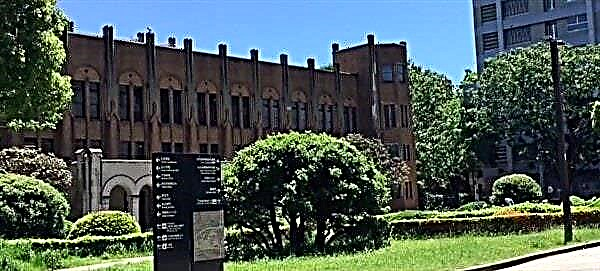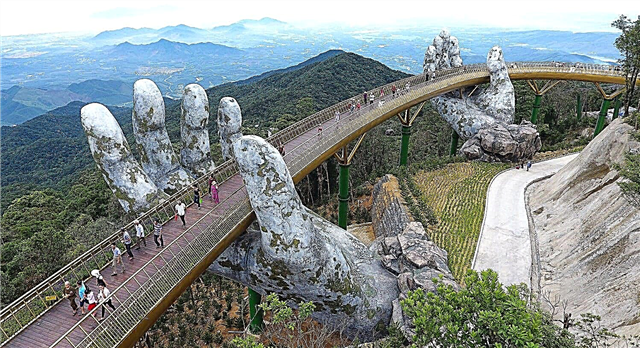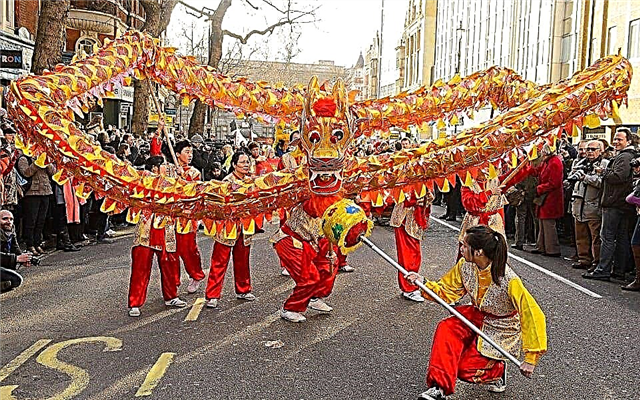In China, they love to celebrate holidays. There are only seven of them in the official calendar, but in fact the total number is much higher. Some of them are celebrated by all, and some cover certain categories of the population.
Chinese holidays - dates, names
The most famous celebrations in China can be roughly divided into the following groups:
- celebrated by small nations;
- state;
- historically formed;
- festivals.
Chinese official celebrations are 8 dates:
| Number | Name | Duration in days |
| 1st of January | New Year | 1 |
| 1st day of the lunar calendar | Chinese New Year - Chunjie | 7 |
| 12 march | Tree Planting Day - Pinyin | 1 |
| April 4 or 5 | Memorial Day - Qingming | 1 |
| 1st of May | Labor Day | 1 |
| 5th day of the V lunar month | Dragon Boat Festival - Duan-wu | 1 |
| 15th day of the VIII lunar month | Mid-Autumn Festival - Zhongqujie | 1 |
| 1 october | Education Day of the People's Republic of China | 5 |
What makes holidays in China special

Almost every official holiday is tied to the lunar calendar. Europeans are forced to check the schedule of holidays published annually by the General Chancellery of the State Council (government) of the PRC, since they are "floating". For example, in 2019, all of China celebrated the Chinese New Year from February 5, and already in 2021, the holiday fell on January 25.
They do not intend to abolish this tradition, although for the whole world it presents a certain inconvenience.
For reference! Some of the dates refer to even more ancient customs. They are tied to the solar calendar and are counted from the equinox and solstice (Dongzhi).
China National Holidays
The list includes:
- Chunjie - from the 1st day of the lunar calendar (lasts 7 days);
- Lantern Festival - 15th day of the 1st lunar month;
- "Pure Light" (Qingming) - 104th day from the winter solstice;
- dragon boat festival - 5th day of the 5th lunar month;
- "Two Nines" - the 9th day of the IX lunar month;
- "Mid-Autumn" is the 15th day of the VIII lunar month.
You May Also Like
Note! All these dates are tied to the archery calendar. They are updated annually.
New Years in China

The calendar beginning of the annual cycle is celebrated here without much fanfare, since it is mostly European. 3 days are allotted for the celebrations: January 1-3.
The Chinese New Year is a different matter: before its end, enterprises stop operating for seven days. For a week, the streets of the cities amaze the imagination with lush glowing garlands, and in their homes the Chinese prepare their favorite delicacies.
The deep source of universal love is at the end of the winter cycle, from this moment spring begins. In any locality of the country, public parades, fairs, costume performances and processions are held. Both old and young are in a hurry to give presents to their beloved relatives.
In China in 2019, Chunjie fell on February 5-20.
Borrowed Holidays
The red numbers of the calendar, beloved by the inhabitants of Europe, are partly repeated in the Chinese modern tradition. It is only natural for local residents to note the following:
- March 8 - International Women's Day;
- May 1 - Labor Day;
- June 1 - World Children's Day.
Note! Valentine's Day, which is rapidly celebrated in Europe, on February 14, fell in love with Chinese youth. So far, he has not found national recognition.
Transfers
Chinese workers are firmly convinced that on the week of the holiday off work, they will have to work on regular weekends (Saturday and Sunday). This is a general rule about which no one has to be warned, although the media always inform about it.
Those Saturday and Sunday, which are closer to the holiday date, are accepted for working off. For example, on a holiday Tuesday, employees will come to work in unison on the previous working Sunday.
You May Also Like
Holidays are not for everyone
A very unusual tradition for Europeans is associated with the following days:
- March 8 - only women work until noon, and men - full 8 hours;
- May 4 - Youth Day - employees of the enterprise in the category of 14-28 years old are allowed to work only half a day;
- June 1 - Children's Day - schoolchildren under the age of 14 do not study;
- August 1 - Army Day - servicemen serve only half a day at their place of service.

Description of some holidays
It should be noted that Chinese holidays in 2019 and any other year have some peculiarities. In order not to be trapped by a tourist due to a lack of knowledge, it is worth learning more about this side of Chinese life in advance.
Day of the departed
"Pure Light" (Qingming) is a national holiday dedicated to the commemoration of ancestors. Officially, this one is always a day off. By tradition, it is celebrated on the 104th day of the winter solstice (most often - the beginning of April).
People come to cemeteries to look after the burials of relatives, decorate them with paper flowers, leave food and drinks, burn incense and ritual banknotes.

Everything that is required to visit the cemetery goes on sale in a week. You can buy it anywhere - in a street stall, at a market stall.
There is a belief that by setting fire to a ritual present, the Chinese pass it on to their loved one in the afterlife. Those who fail to reach the cemetery are allowed to stage traditional ritual burnings in the streets. In the light of the sun, it becomes crowded in the sky from soaring large and very tiny kites, and in the evening living lights are kindled everywhere.
Moon day
Zhongqiujie (Mid-Autumn Festival in China) always falls on the full moon - the 15th of the 8th lunar month (usually from mid-September to early October). By this time, the rural suffering ends everywhere, it is customary to pay tribute to the worship of the Goddess Moon or Yin.

According to the myth, in former times there were 10 solar disks in the sky at the same time. Animals and plants were thirsty and drought. Archer Hou Yi shot 9 suns. His reward was the elixir of immortality. The hero's wife, Chang'e, stole the drink, drank it and soared into heaven. Hou Yi had to accept and admire the female figure seen at night against the background of the full moon. It is customary to celebrate at night, without leaving home.
It is interesting! In every house in Zhongqiujie, yuebins are baked - moon cakes, on the surface of which hieroglyphs are squeezed out. There are many variations - from sweet ones with jam and nuts to spicy ones stuffed with minced meat or mushroom.
Lantern Festival in China - Yuanxiaojie
It concludes the 2-week New Year celebrations. It is held on the 15th day of the 1st lunar month. The symbolism of the ancient custom is a tanyuan dish and round lanterns made of red translucent paper.
Tanyuan are boiled or fried rice cereal balls stuffed with fruits, nuts, meat, vegetables. They are prepared only in the company of those closest to you.

Everywhere the Chinese are releasing lanterns into the sky, which, according to legend, should show the souls of the dead who have come, the way back to heaven in the dark. In the parks for the Lantern Festival in China, fireworks are colored in the sky, and in the squares they perform dances in fabulous tiger or dragon outfits.
Singles Day in China
Shuang Shi'i is a relatively young tradition, its date is November 11 (11.11). Young people who have not found a match for themselves at the moment rush to bars, clubs, any meeting places to make a blind rendezvous, to get to know someone.
It is generally accepted that everything only favors new relationships. Equally traditionally, unprecedented sales start in the Internet space (for example, Aliexpress).
Dragon Boat Festival in China
Duan-wu falls on the 5th day of the V lunar month ("Two Fives"). Dedicated to an event that took place during the era of the Chu kingdom.The poet Qu Yuan, when the army of the Qin kingdom conquered the country, committed suicide by drowning in the river. The search for Qu Yuan's body took a very long time. Rowers threw rice groats overboard into the river water, thereby frightening off evil spirits and inhabitants of the river bottom. Paying tribute to the memory of Qu Yuan, they began to hold competitions on boats, and the zongzi dish became a symbol of the festival.

Rice baked goods with different contents, wrapped in cane or bamboo leaves, tied with yarn criss-cross, is zongzi. Each region has its own filling. They are sold everywhere.
On all reservoirs, competitions are held on traditional boats decorated with dragons. Rowers in them - 10-20 people, and on the nose the drummer taps a certain rhythm. Children are usually presented with jewelry made of multi-colored threads for good health and against the evil eye.
Valentine's Day
On the 7th day of the 7th lunar month in China is traditionally the day of lovers or Tsisidze ("Two Sevens"). The most popular version of the myth tells: the shepherd Niulan kidnapped the outfit of the girl Chzhinyu, splashing in the river, who turned out to be a goddess, for the sake of fun, descended to the ground with his maids. The lovers got married, and then the Heavenly Emperor took his daughter back. Once a year, Jinyu and Niulan meet on a bridge over an impassable river.

Couples try to spend every free minute together, exchange gifts, arrange pleasant surprises and try to perform something special and memorable.
Official holidays in China and public holidays
Workers rightfully stay at home:
- January 1 (1 day);
- Chunjie - 7 days;
- Qingming;
- Labor Day;
- Duan-wu;
- Zhongqiujie;
- Day of the formation of the People's Republic of China.
Note! There are also memorable dates of ethnic peoples; in some territories of the country, by order of local authorities, they are also able to add to the list of weekends.
"Golden Week" in China is what
As soon as the national holiday is combined with Saturday / Sunday, it is postponed to the next production working day. That is why Chunjie and the Day of the Education of the People's Republic of China last for 7 days: they are united at the end of the week. It turns out 2 "golden weeks" a year. Until 2008, there were 3 of them, but now Labor Day is 1 day.
China Holidays, Distributed by All Months
Annual "red" calendar:
- I - New Year;
- II - Chunjie and the Lantern Festival;
- III - Er Yue Er, March 8, Pinyin;
- IV - April Fool's Day and Qingming;
- V - days of workers, youth, mother;
- VI - world day of children, father, Duanwu;
- VII - creation of the Communist Party of the PRC;
- VIII - Qixijie, the founding of the Chinese army;
- IX - Zhongtsiujie;
- X - creation of the PRC and "Two Nines";
- XI - Shuang Shi'i;
- XII - Dongzhi.
Chinese festivals
A colorful procession, carnival, folk festivities and beautifully decorated city streets are the most common Chinese festival. Whichever city the traveler travels to, lavish celebrations await him everywhere.
In addition to the days of the most important celebrations in all regions, they do not miss the opportunity to celebrate:
- anniversary of the commander Che Kung;
- Chin Ming - the name day of the goddess Tin Hau;
- Hong Shin Festival;
- 8th day of the 4th month according to the lunar calendar - the birth of Buddha;
- Chkhenchau Bun Festival;
- Duan-wu;
- 7 Sisters Festival - Chung Jung;
- winter solstice.
What the traveler should remember
Planning a vacation trip to the PRC should be in advance - this is the golden rule of a successful voyage. It applies to reservations for flights, hotel rooms and even guide services.
The first plus of long-term planning: the purchase of everything you need with big discounts on the days of national sales. Second: the ability to do without delays due to the fact that necessary and important issues have to be addressed during the holidays, when the lion's share of officials and services become unavailable.
Foreigners are fascinated by the love of the Chinese for their own history, embodied in lavish celebrations dedicated to various historical and cultural events. The fact that most of them are timed to coincide with the days of the lunar calendar only adds to their national flavor.











